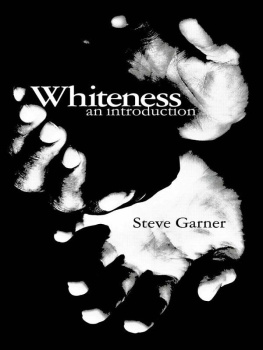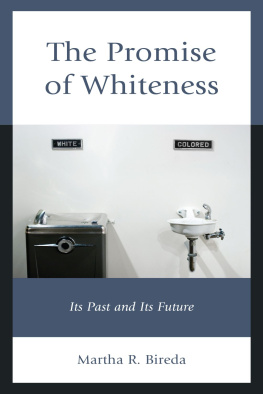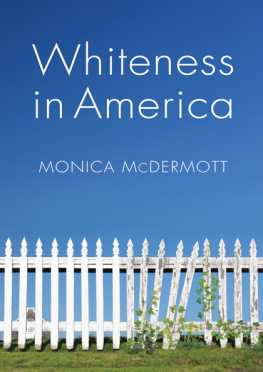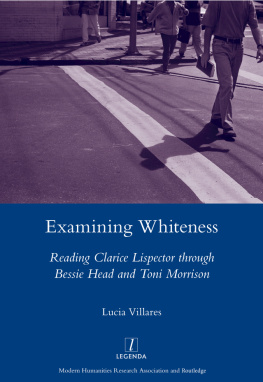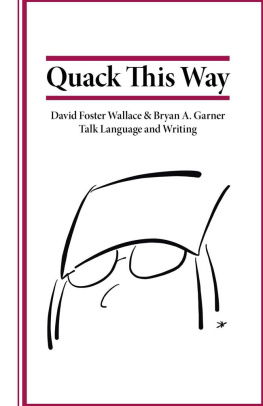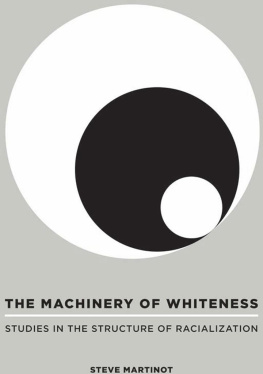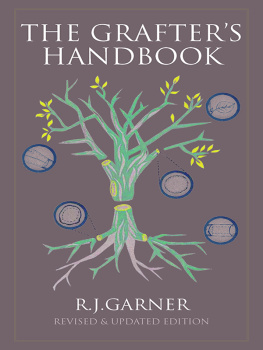Steve Garner - Whiteness
Here you can read online Steve Garner - Whiteness full text of the book (entire story) in english for free. Download pdf and epub, get meaning, cover and reviews about this ebook. year: 2007, publisher: Taylor and Francis, genre: Politics. Description of the work, (preface) as well as reviews are available. Best literature library LitArk.com created for fans of good reading and offers a wide selection of genres:
Romance novel
Science fiction
Adventure
Detective
Science
History
Home and family
Prose
Art
Politics
Computer
Non-fiction
Religion
Business
Children
Humor
Choose a favorite category and find really read worthwhile books. Enjoy immersion in the world of imagination, feel the emotions of the characters or learn something new for yourself, make an fascinating discovery.
- Book:Whiteness
- Author:
- Publisher:Taylor and Francis
- Genre:
- Year:2007
- Rating:3 / 5
- Favourites:Add to favourites
- Your mark:
- 60
- 1
- 2
- 3
- 4
- 5
Whiteness: summary, description and annotation
We offer to read an annotation, description, summary or preface (depends on what the author of the book "Whiteness" wrote himself). If you haven't found the necessary information about the book — write in the comments, we will try to find it.
Whiteness — read online for free the complete book (whole text) full work
Below is the text of the book, divided by pages. System saving the place of the last page read, allows you to conveniently read the book "Whiteness" online for free, without having to search again every time where you left off. Put a bookmark, and you can go to the page where you finished reading at any time.
Font size:
Interval:
Bookmark:
Whiteness
One of the key areas of debate about race and ethnicity in recent years has been the question of the construction of whiteness. Much of this literature has focused on the situation in the USA but there has been a rapid growth of interest in other countries. This book highlights some of the key features of these debates. The author, Steve Garner, argues that whiteness is a multifaceted and fluid identity which must be incorporated into any contemporary understandings of racism as a system of power relationships. This innovative book:
- provides a critical review of key themes for the multidisciplinary literature on whiteness;
- utilises a balanced combination of theory, existing empirical data and new fieldwork to demonstrate how political identities are being expressed with the idea of whiteness holding them together;
- presents ways in which whiteness has been conceptualised in the past and at present;
- presents examples of marginal Whites, nation-building and white minorities.
Whiteness is an essential purchase for students of Sociology, History, Politics and Cultural Studies studying topics relating to Race and Ethnicity and Whiteness Studies.
Steve Garner is Senior Lecturer in Sociology at the University of the West of England, Bristol. He has published on racism, immigration, whiteness and colonialism.

LONDON AND NEW YORK
First published 2007
by Routledge
2 Park Square, Milton Park, Abingdon, Oxon OX14 4RN
Simultaneously published in the USA and Canada
by Routledge
270 Madison Ave, New York, NY 10016
Routledge is an imprint of the Taylor & Francis Group, an informa business
This edition published in the Taylor & Francis e-Library, 2007.
To purchase your own copy of this or any of Taylor & Francis or Routledges collection of thousands of eBooks please go to www.eBookstore.tandf.co.uk.
2007 Steve Garner
All rights reserved. No part of this book may be reprinted or reproduced or utilised in any form or by any electronic, mechanical, or other means, now known or hereafter invented, including photocopying and recording, or in any information storage or retrieval system, without permission in writing from the publishers.
British Library Cataloguing in Publication Data
A catalogue record for this book is available from the British Library
Library of Congress Cataloging in Publication Data
Garner, Steve, 1963
Whiteness : an introduction / Steve Garner.
p. cm.
ISBN 978-0-415-40363-4 (hardcover)ISBN 978-0-415-40364-1 (papercover)
1. Whites Race identity. 2. Racism. 3. Race discrimination.
I. Title.
HT1575.G37 2007
305.8 dc23
2007002177
ISBN 0-203-94559-X Master e-book ISBN
ISBN10: 0415403634 (hbk)
ISBN10: 0415403642 (pbk)
ISBN10: 020394559x (ebk)
ISBN13: 9780415403634 (hbk)
ISBN13: 9780415403641 (pbk)
ISBN13: 9780203945599 (ebk)
My fascination with whiteness as a state of being has a long genealogy, going back to experiences in England and the USA in the 1980s, France and Ireland in the 1990s and the early twenty-first century. Working seriously on whiteness as a conceptual tool, however, can be traced back to my interest in the extraordinary experiences of Ireland and the Irish that is still expressing itself in my publications. The background work to my book Racism in the Irish Experience (RIE), done in the period 19982003, raised a lot of the questions, without providing many answers, and I realised that it could not satisfactorily contain these. I gave a paper at a conference in March 2004, which later became The Uses of Whiteness, and began to feed, to a certain extent, into a project on identity, home and community funded by the ESRC. So acknowledgements must go, first, to the people mentioned in the acknowledgements page of RIE, and then to the ESRC, and especially the Programme Director Margie Wetherell, for all her constructive criticism and support. My work never really gets going without a series of dialogues, so the roll of honour must start with my colleague Simon Clarke, whose engagement with the theme has helped me clarify enormously. Thanks also to people who have discussed the idea of whiteness with me, whether they are sceptics or believers, or even dropped me an email on the subject (in alphabetical order): Ama de Graft Aikins, Lisa Anderson-Levy, Les Back, James Barrett, Woody Doane, Charles Gallagher, Yasmin Gunaratnam, Mike Hill, Paul Hoggett, Derek Hook, Caroline Howarth, David James, Cecily Jones, Eric Kaufman, David Lambert, Karyn McKinney, Karim Murji, Alice Pettigrew, Chris Quispel, Diane Reay, David Roediger, Ben Rogaly, Bev Skeggs, Becky Taylor, Ann Twinam, Katherine Tyler, and Paul Watt. If I have missed you off the list I apologise profusely.
Three cohorts of students on my undergraduate module on racism at Bristol-UWE have also contributed to this work, in various ways.
Of course, no-one writes an introductory text without standing on the proverbial shoulders of giants, who are, in this case, inter alia: James Baldwin, W.E.B. Du Bois, Toni Morrison, bell hooks, Cheryl Harris, David Roediger, John Hartigan, Ruth Frankenberg, Charles Mills, and Richard Dyer.
At Routledge, I was fortunate to have very competent and supportive colleagues, Gerhard Boomgarden and Constance Sutherland, then Ann Carter.
As ever, my family bear the brunt of writing activity, and I thank them for their love and support.
What is whiteness exactly, and what is the point of using it as a separate problematic in the social sciences? Isnt this exactly the kind of American cultural imposition that Bourdieu and Wacquant (1998) rail against? How could American debates have relevance in Britain, Latin America, Australia, for example? The first thing to establish is that whiteness has no stable consensual meaning, and has been conceptualised in a number of different yet not mutually exclusive forms. As much as anything, it is a lens through which particular aspects of social relationships can be apprehended.
When, in early 2004, I began the task of grappling with whiteness as it had been deployed by academics in the USA, I did so with two assumptions. The first was that whatever was specific about one countrys historical experience and the ways that the fiction of race are managed collectively, it could not be specific to anothers. The meanings attached to race are always time- and place-specific, part of each national racial regime. Whiteness is no exception. The second was that whatever I was studying had to be part of the endeavour to contribute to anti-racist scholarship, by emphasising the social relationships referred to as racism. Since then, after conducting qualitative research, and through reading through and talking around issues that using whiteness throws up, I have realised that when we talk about this topic we do so from points of knowledge and experience in which such assumptions are not the norm. In this book, I want to emphasise that these two assumptions have guided me so far and I have no reason to replace them. In fact, I am pushed to stress, first, that the best way to understand whiteness is to think both relationally and comparatively, and second, that if what we are doing is not a contribution to anti-racist scholarship then we should stop doing it immediately.
There are two main problems that this position generates. First of all, not everyone yet agrees as to how best to combat racism. This would be true even if the academic study of whiteness did not exist. As it does, the debate about whether using whiteness actually contributes anything will go on. Sara Ahmeds (2004) influential article, for example, declares whiteness as non-performative (i.e. unable to actually be anti-racist given the structural racism that surrounds production of texts on whiteness). Howard (2004) criticises the use of racist ideas within the whiteness paradigm, and Eric Kaufman (2006b) calls the whiteness paradigm a blunt instrument, and likens it to a training bicycle with stabilisers in the developmental sequence of studies of ethnicity. Clearly, these critiques require responses, which shall be attempted on the back of the arguments presented here, and expressed in the final chapter. Moreover, many social scientists are squeamish about using the term whiteness. Wendy Shaw notes that... research on whiteness has tended to suffer from guilt by discursive association with the bulk of
Font size:
Interval:
Bookmark:
Similar books «Whiteness»
Look at similar books to Whiteness. We have selected literature similar in name and meaning in the hope of providing readers with more options to find new, interesting, not yet read works.
Discussion, reviews of the book Whiteness and just readers' own opinions. Leave your comments, write what you think about the work, its meaning or the main characters. Specify what exactly you liked and what you didn't like, and why you think so.

